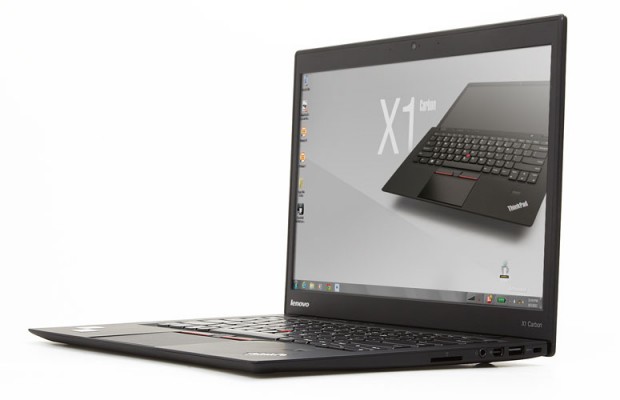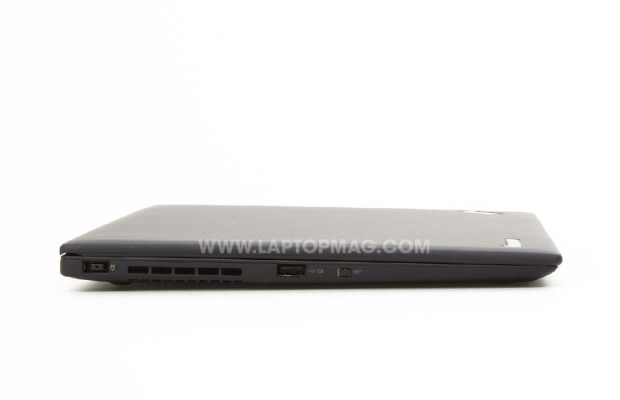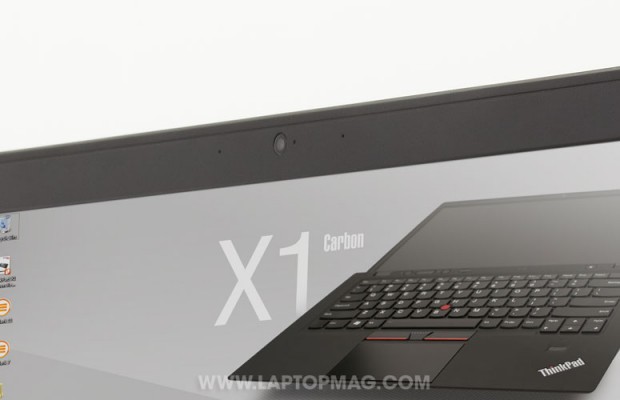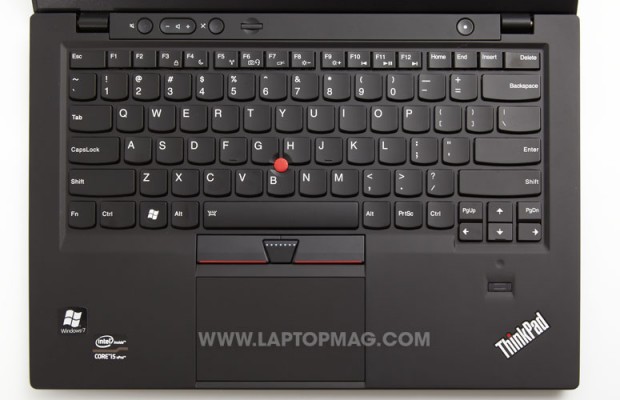ThinkPad X1 Carbon First Test Results: This Ultrabook Means Business
Lenovo's 13-inch ultraportable notebooks have a rich history, dating back to 2008's ThinkPad X300, which was a such a groundbreaking portable that journalist Steve Hamm wrote a book about it called "The Race for Perfect." Fast forward to 2012 and, after dropping the X300 and its successor the X301, Lenovo is trying to rebuild its street cred in the ultraportable space. Last year's ThinkPad X1 had the best keyboard we've ever tested, but a weak screen and even weaker battery life. Now comes the ThinkPad X1 Carbon, a 14-inch Ultrabook in a super-svelte 3-pound, .74-inch thick body.We just got our review unit in and, while we're not done testing it, we have a number of initial impressions.
Update: Read our full review of the ThinkPad X1 Carbon
Design
If you love the classic ThinkPad aesthetic like we do, you'll like the look of the X1 Carbon. If you're sick of the understated, raven black chassis we've seen on Lenovo's business notebooks for the past 20 years, you may not be impressed. Still, at just .74-inches at its thickest point and a mere 3-pounds, this is the thinnest and lightest ThinkPad we've ever used. This Ultrabook is .4 pounds lighter than the 12.5-inch ThinkPad X230 and about on par with the .68-inch thick, 3-pound MacBook Air.
Like the ThinkPad X1 before it, the X1 Carbon is built for durability as it has passed 8 differe MIL-SPEC tests, including those which measure the ability to operate at extreme temperatures, altitudes and when being hit by sand. Like other ThinkPads, it has a roll-cage, but this time the cage is made from lightweight carbon fiber rather than magnesium. The X1 Carbon certainly felt durable in our testing as we were able to hold it by the deck with one hand, without feeling like the notebook would slip.
Ports and Webcam
In order to make the X1 Carbon so thin, Lenovo has jettisoned several important ports. In particular the lack of an Ethernet connector will irk some business users. In many locations, wired Internet is much more reliable than wireless. Fortunately, Lenovo includes a USB-to-Ethernet dongle which solves this problem, as long as you remember to bring it along.
Sign up to receive The Snapshot, a free special dispatch from Laptop Mag, in your inbox.
The notebook is equipped with a mini DisplayPort for video out, a 4-in-1 card reader and an audio jack, but just two USB ports, only one of which is USB 3.0 compatible. Business users with older projectors will definitely miss having a VGA port. Despite the limited space, Lenovo somehow found room for a hardware Wi-Fi on/off switch, which just duplicates functionality that's available in Windows already. We would have preferred a third USB port or Ethernet.
Display and Audio
The X1 Carbon's 1600 x 900, 14-inch matte display is truly stunning. Using our light meter this ThinkPad's screen registered 290 lux, which is even brighter than the 1400 x 900 MacBook Air's 268 lux mark. However, the ASUS ZenBook Prime and its 1920 x 1080 display returned a much stronger measurement of 423 lux.
When we watched a 1080p QuickTime Trailer for SkyFall, images were sharp and detailed while colors were vibrant, though not quick as rich as on some other notebooks we've tested. Viewing angles were excellent; colors didn't wash out at all, even at 90 degrees to the left or right.
The bottom-mounted speakers provided clean audio that was just loud enough to fill a small room at maximum volume. When we listened to both the bass-heavy "Forget Me Nots" and the guitar-laden "Basketcase," sound was good quality was good enough to substitute for a low-grade stereo. Certainly, the Dolby v. 4 Home Theater software helped, particularly when we switched it into music mode. However, when we tried using the notebook on our lap, the speakers became just a little bit muffled.
Keyboard and Touchpad
The X1 Carbon's island-style keyboard looks just like those on the recent ThinkPad T430 and W530, but it feels quite a bit shallower. Perhaps because the chassis is so much thinner, Lenovo had to sacrifice vertical key travel, which is a shame. Overall, we enjoyed typing on the keyboard and loved the feel of the comfortable, soft-touch palmrest under our wrists, but there is no doubt that it is not nearly as responsive as the keyboards on its thicker brethren. Even the MacBook Air's keyboard seemed to have more depth and stronger feedback.
As with other ThinkPads, the X1 carbon has two different pointing devices. The TrackPoint pointing stick is incredibly accurate and comfortable, just as it is on every other recent ThinkPad. We highly recommend the stick because it provides the most accurate means of navigating around the desktop and allows you to move your pointer without taking your fingers off of the homerow.
Those who prefer a touchpad will like the large 4 x 2.4-inch glass touchpad. Unlike Lenovo's other touchpads, which recently have had textures, this pad has a completely smooth surface that feels so smooth that sometimes we found our finger sliding around a bit. However, the pad was incredibly accurate and, despite its integrated buttons, it displayed none of the jumpiness we've seen on some other clickpads. Multitouch gestures like pinch-to-zoom and three finger swipe were smooth, but two-finger rotate only worked some of the time.
Heat
The Thinkpad X1 Carbon stayed pleasantly cool throughout our tests. After streaming a video for 15 minutes, we measured the touchpad at 77 degrees, the keyboard at 85 degrees and the underside at 92 degrees Fahrenheit. We consider temperatures below 95 degrees comfortable.
Performance
With a 1.8-GHz Core i5-3427U under the hood and integrated graphics, the ThinkPad X1 Carbon is good enough for productivity tasks like crunching spreadsheets and transcoding videos. On PCMark 7, a benchmark that measures overall performance, the X1 Carbon scored a solid 5,297, well above the 2,854 Ultraportable average. This score also beats the 13-inch MacBook Air (4,380), which has the same CPU and the ZenBook Prime UX31A (4,989).
The 128GB SanDisk SSD booted into Windows 7 in a slow 56 seconds, 12 seconds behind the category average and way slower than ZenBook Prime (23 seconds) and the Fujitsu LifeBook U772 (27 seconds). The drive took a modest 1 minute to complete the LAPTOP File Transfer test, which involves copying 4.97GB of mixed-media files. That's a rate of 84.8 MBps, which is about 50 percent faster than the 56 MBps category average, but slow for an SSD.
The SSD-powered MacBook Air completed the test at a rate of 159 MBps while the Fujitsu LifeBook U772 managed a rate of 121.2 MBps.
When it comes to perfoming productivity tasks, the ThinkPad X1 Carbon is no slouch. It took a mere 5 minutes and 37 seconds to complete the LAPTOP Spreadsheet Macro test, which involves matching 20,000 names with their addresses in OpenOffice calc. That time is significantly faster than the 8:08 category average, but still behind the 2.6-GHz Core i5-3320M-powered ThinkPad X230 (4:29) and the 1.9-GHz Core i7-powered ASUS ZenBook Prime (4:59).
Graphics
Just forget about gaming on the ThinkPad X1 Carbon. With its integrated Intel HD 4000 graphics, it scored just 517 on 3DMark11, a synthetic graphics benchmark. That's way below the 814 category average and the 624 offered by the MacBook Air.
When we tried playing World of Warcraft on the X1 Carbon, it managed a barely-playable 29 frames per second on autodetect settings and an unplayable 14 fps with the special effects turned up. Those rates are worse than the 46 / 23 fps category averages.
Early Verdict
The ThinkPad X1 Carbon feels really good on our lap, it has an excellent screen, solid sound and accurate pointing devices. Though the keyboard doesn't offer the level of feedback we expect from ThinkPads, it is one of the best Ultrabook keyboards around. What will really make or break this notebook is its battery life, which we have yet to test. Lenovo says to expect up to 7 hours of endurance, but our battery test tends to produce results that are below manufacturer's claims. Stay tuned for our full rated review.





